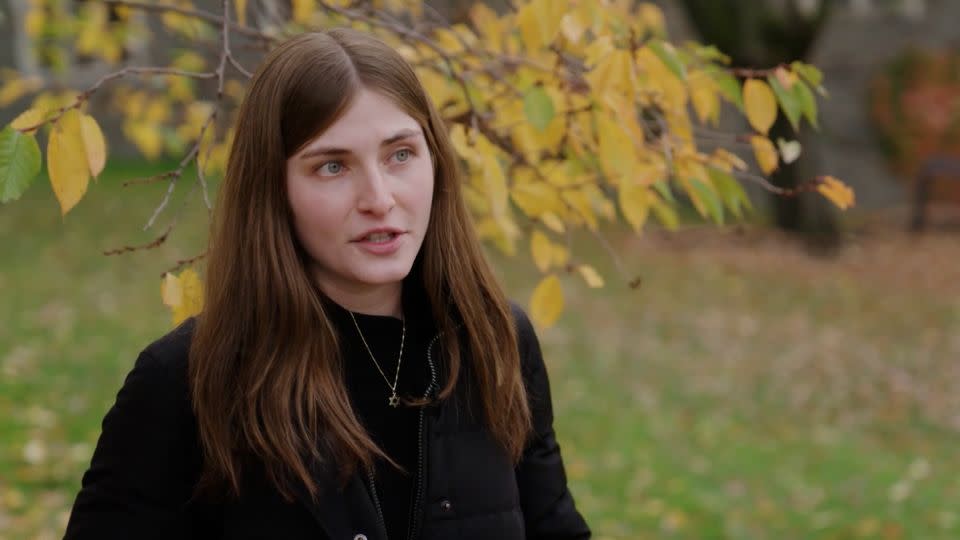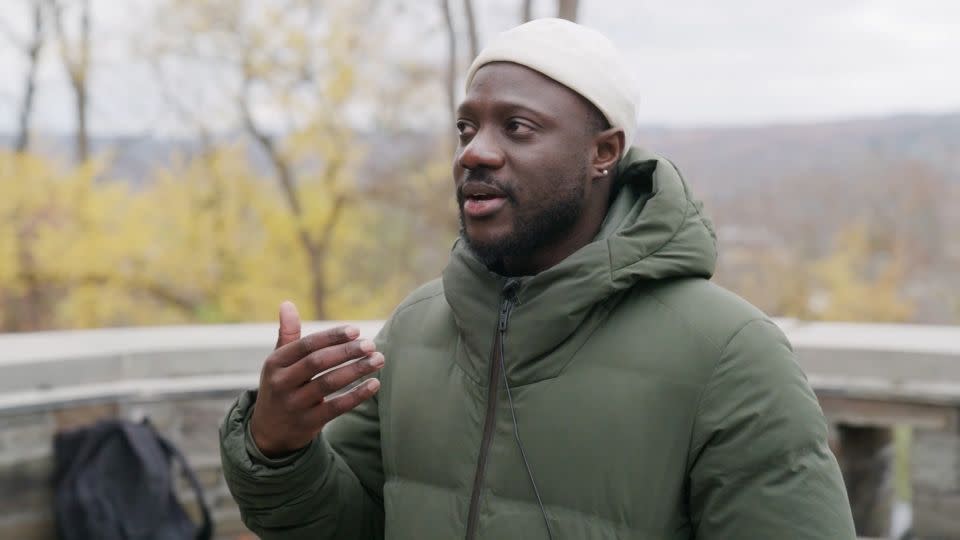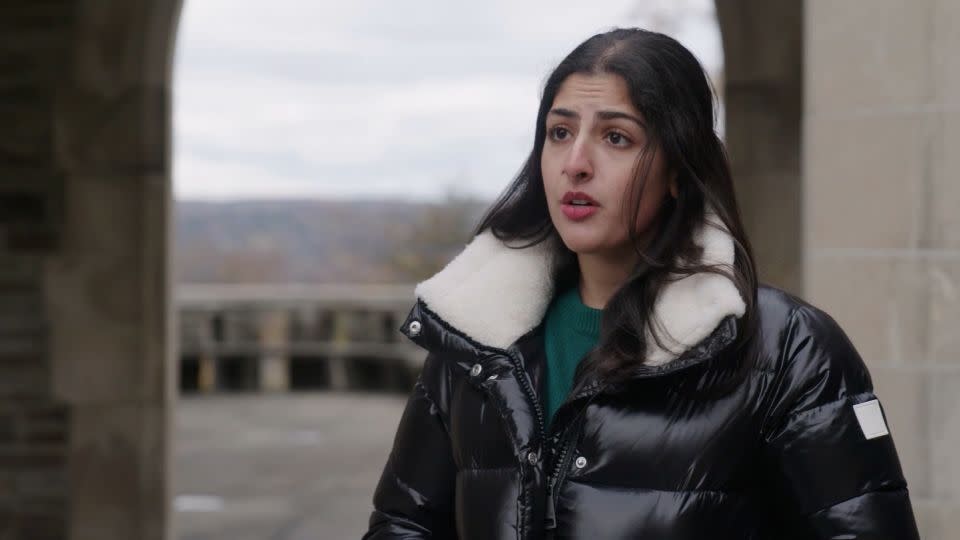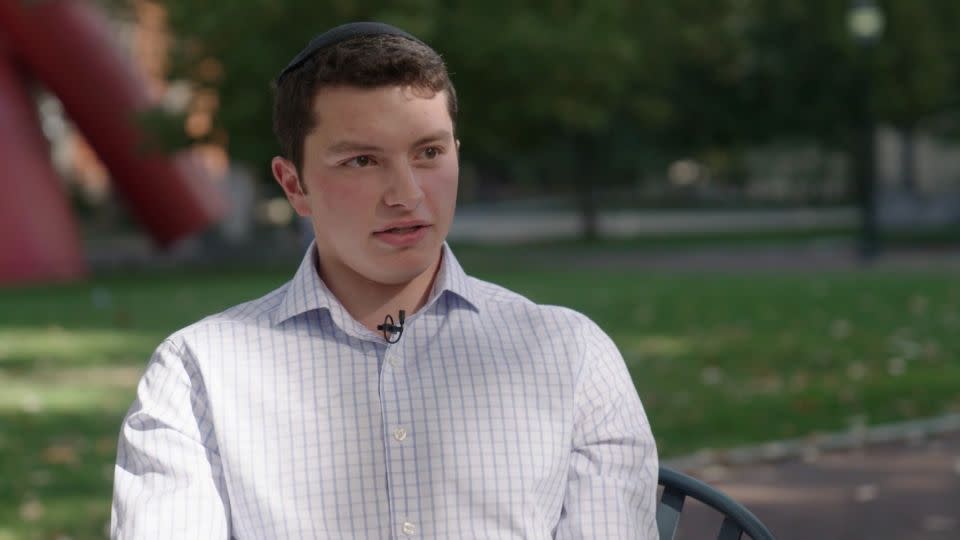Protest, fear and pride: US college students reflect on how they’re impacted by Israel-Hamas war
Students have held hundreds of protests and counterprotests on college campuses since the October 7 Hamas attacks on Israelis and Israel’s airstrikes on Gaza in response.
At Tulane, a fight broke out after someone tried to burn an Israeli flag. At Columbia University, posters of kidnapped Israelis were torn down. At Harvard and Columbia, a so-called “doxxing truck” showed up on campus naming students whose organizations co-authored a statement saying Israel is “entirely responsible” for the deadly October 7 attacks by Hamas and “all unfolding violence.” And at Cornell, classes were canceled Friday after death threats were posted toward Jewish students under the username “hamas soldier” on a Greek life website. A few days after the postings, 21-year-old Cornell student Patrick Dai was arrested and federally charged with making online threats. He has not entered a plea.
CNN visited the campuses of Cornell and the University of Pennsylvania, to hear from students about what it’s been like on campus.
Malak Abuhashim, Cornell University

“This has been an issue that’s affected me my entire life,” Malak Abuhashim said. The Cornell chemical engineering student is Palestinian and said she reluctantly decided to lead the Cornell chapter of Students for Justice in Palestine because she felt like she had to.
This was not the first time she’d been personally affected by war in the region, even while in college. She has family in Gaza. She’d been on the phone with them and could hear explosions in the background, and said it was hard being so far from them.
On October 7, when, like many people around the world, Abuhashim still didn’t know the scale of the Hamas attacks in Israel, she was already “really, really worried,” she said. “I knew right away that whatever happened in Israel, Gaza would be punished 20,000 times more. I knew that the consequences were going to be very severe. I knew that the destruction was going to be horrible.”
She said an aunt was leaving northern Gaza along an evacuation route when an airstrike hit a bus only a few cars ahead of her in traffic. CNN could not independently verify this incident. Her family hasn’t been able to contact other relatives. “We really aren’t sure who is alive, who isn’t.” She’d seen a story about an Al Jazeera reporter whose family was killed in an explosion in Gaza. She wondered: If that had happened to her family, would she even know?
College is a place to learn, but ignorance can still sting. “What really hurt the most was when students would try to deny my history or my past,” Abuhashim said.
“For example, my grandparents’ village was ethnically cleansed. And when I brought this up to a student, they tried to erase the history and be like, ‘No, they left willingly.’” Abuhashim thought it was absurd, the idea her grandparents would give up their livelihood to live in a refugee camp. “That’s what allows this type of hatred, this type of division between people – where someone’s so convinced in this tunnel vision that they’re correct.”
The national chapter of Students for Justice in Palestine has drawn intense criticism for calling the Hamas attacks a “historic win.” Abuhashim said she did not work with the national group or get talking points from it. Her chapter of SJP was focused on supporting students on campus, whether pushing the administration to show them more support or protecting students from outside groups trying to dox them (or post their identifying information online).
She was upset when she saw the antisemitic threats made to her fellow Cornell students. “Those were very hateful things to say,” she said. As a Muslim, she thought it was “very disrespectful” to make them “in the name of Allah.” She said, “Antisemitism will never be accepted in our movement.”
Zoe Bernstein, Cornell University

Zoe Bernstein had never felt antisemitism on campus at Cornell, where she’s a senior and president of Cornellians for Israel. But the shock of the antisemitic online threats had “amplified all of the feelings of despair,” she said.
She said she interpreted the hateful messages as being directed at all Jewish students on campus, and she said she feels a disconnect between the campus threats and what was happening in Israel.
That was also true of antisemitic incidents around the world. “I think that does conflate antisemitism with anti-Zionism. And I think that unfortunately, right now, it seems like they’re pretty inextricably linked,” she said. “You can criticize any government in the world but you don’t have to come attack civilians in other countries about it.”
Bernstein says she has family and friends in Israel, and she was disturbed by how quickly misinformation spread online. Many students felt pressure to post something, she said.
“People think that their silence is kind of complacency on either side. And I just don’t know how much I agree with that,” she said.
When peers posted misinformation, others would swoop into the comments to correct them. “And then students have become embarrassed, students have become ashamed, students have become angry. And it’s just amplifying tensions.” She wanted the campus to calm down so they could go back to focusing on their studies.
Bernstein wore a gold Star of David necklace draped over a black turtleneck. She wasn’t scared to wear it, even with the threats. “I wear it with pride. I’m wearing it more now than I ever have before,” she said. “I’m so, so proud to be a Jew at this time, seeing the resiliency of my community, seeing the unity of my community. It really has only strengthened me in my pride since October 7.”
Momodou Taal, Cornell University

Momodou Taal was shocked by the threats. Taal, a second-year PhD student at Cornell, grew up in London, but his family is from Gambia and Senegal. He said he was a member of the college’s Coalition of Mutual Liberation that supported pro-Palestine rallies. “Our movement is anti-racist. And we have made it quite clear that we’re not going to stand for any antisemitism,” Taal said.
He was also worried about backlash from last week’s antisemitic online threats. “Given the climate we’re in, we are going to be demonized by those statements, even if it came from none of us.”
He was frustrated with being asked, again and again, if he condemned Hamas. He doesn’t represent Hamas and he has no control over Hamas, he said. He felt like there was an implicit presumption in the question that he supports terrorism.
“I can say clearly categorically I abhor the killing of all civilians no matter where they are and who does it,” Taal said. “I love life. I don’t love death. That’s what I am as a human being. Why is it the association because I’m a Muslim and I’m a Black person, I have to condemn a proscribed terrorist organization before having an opinion on genocide?”
“I don’t go around asking White people, ‘Do you condemn the KKK?’ Why is there an assumption that you’d be supporting the KKK in the first place?”
He felt ignored and marginalized as a Muslim, especially a Black Muslim, on campus. But even so, “I feel encouraged – because history is on my side. The same people in the 80s that called Nelson Mandela a terrorist, and literally armed and backed apartheid, were on the wrong side of history,” Taal said. “I feel like we’re on the right side of history.”
Talia, Cornell University

After Talia saw the threats, she and a friend spent the rest of the evening in their apartment, scared to leave. A junior at Cornell, she kept pepper spray in her pocket, and reached for it when she heard a knock at the door. (It was just a friend coming to visit.)
For Talia, who did not want her last name published, the threats immediately recalled the experience of her parents: Iranian Jews who fled their country fearing religious persecution. “It’s absurd that I can even connect Iran in the 80s to Cornell in 2023,” she said. “This isn’t anything that we thought we would ever have to deal with in the United States.”
Cornell’s administration and police had been very supportive, she said. “But at the same time, it is such a helpless feeling to know that you can’t stop someone from coming into your house and shooting you point-blank in the face, which was the exact threat. And it only takes one person.”
Some students had decided to go to class via Zoom, she said. “There were people on Zooms in classes that I didn’t even know were Jewish,” she said. “But at the end of the day, a threat to Jews, it doesn’t matter whether you’re religious or you’re cultural, it is a threat to all Jews.”
Sean, University of Pennsylvania

“This is personal for me,” Sean, a sophomore at Penn, said. His father was born a Catholic in Northern Ireland during the Catholic-Protestant sectarian strife known as the Troubles. He said he’d learned through his father what it was like to be discriminated against and to be called a terrorist for opposing an “oppressive regime.”
Sean asked for his last name not to be used as he saw echoes of that in the backlash to pro-Palestinian protests on college campuses, with university donors withdrawing support, and CEOs saying they wouldn’t hire students who signed controversial pro-Palestinian statements. Even his dad had joked, “Don’t go on CNN,” because it might make it impossible for Sean to get a job, he said.
“You see thousands of children dying, it doesn’t take a terrorist to want to support them,” Sean said. “It doesn’t take someone with bad will to support life.”
There was controversy over a common chant at the pro-Palestine protests: “From the river to the sea, Palestine will be free.” Some Jewish students told CNN they heard it as a call for Jewish genocide in Israel, whose borders include the Jordan River and the Mediterranean Sea.
Sean again looked at the experience of his dad, who was from Derry. “They have ‘Free Derry’ on every wall to say they do not support the British government. They say that they want their own homes back. Is that terrorism? To have your home taken from you and want it back? No, that’s just living life.”
Beni Romm, University of Pennsylvania

For Beni Romm, “From the river to the sea” had a different meaning. Romm is a freshman at Penn, but he spent two years after high school studying in Israel at a yeshiva, a traditional Jewish educational institution. The chant, he thought, meant one thing in the Middle East and another to Americans. To Romm, “It says that we don’t want any Jewish state between the Mediterranean Sea and the Jordan River; we want only a Palestinian state.”
“Calls for ‘from the river to the sea’ … although they can be construed as a calling for things other than Jewish genocide, touch a certain nerve in the Jewish conscience of existential threat,” Romm said. Those chants would never invite a conversation with Jewish students, he said.
Romm had seen a pro-Palestinian protest while walking to a physics quiz, and initially just stopped to listen. But after 45 minutes, “I started being perturbed by what was being said … Things like ‘shame on the IDF,’ ‘the IDF is committing genocide,’” he said. He had friends his age in Israel who were serving in the IDF, the Israel Defense Forces. “This call of ‘shame on the IDF,’ and even like ‘shame on Israel’ – which to me speaks to shame on Israel and Jews in general – hits very personally, because these are my friends and my family. And I don’t believe that they’re committing genocide, as the allegations have it.”
At a later pro-Palestine rally, Romm and some friends set up a table nearby, and had a few good conversations with students who disagreed. But he said he’d been taken aback when, while having a conversation with a Black student, someone walked up and said, “Are you being racist to him? I hope you’re not being racist, like you’re being racist to everyone else on campus.” There were other incidents he felt were connected. He said a friend from class had called him a fascist on social media. A Jewish fraternity was hit with graffiti that said “Jews R Nazis.” Romm thought the anger at Israel was now being directed at Jewish students.
“There is a connection between protests that say the Israeli government is a fascist government, Zionism is racist, and that Israel is perpetrating genocide … and actions towards Jews on campus of calling us racist, or calling us fascist, or accusing us writ large of being Nazis and perpetrating genocide,” he said.
CNN’s Samantha Guff and Deborah Brunswick contributed to this story.
For more CNN news and newsletters create an account at CNN.com


